NEWS
28.09.2021
"I Even Tried Rapping!" Hironobu Kageyama Shares What He Learnt from His Dragon Ball "Music Training"
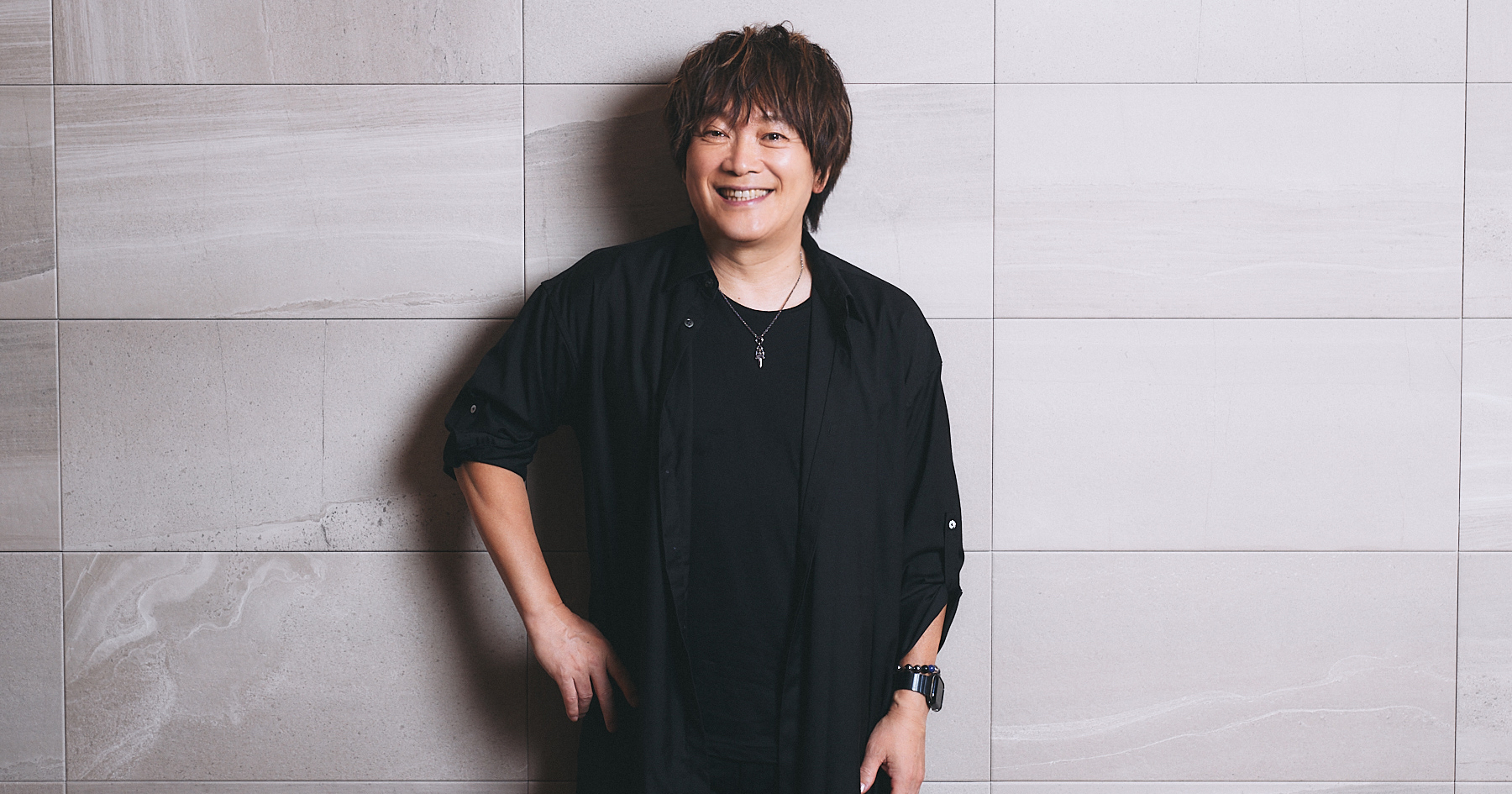
Known to fans as "the Prince of Anime Songs", Hironobu Kageyama has been the vocalist for somewhere in the region of 70 Dragon Ball songs. His career as an artist has seen some spectacular heights thanks to, and is largely inseparable from, the Dragon Ball series.
After a period of underwhelming success in the wake of his debut, Kageyama speaks of his fateful encounter with what would go on to be his most iconic song, "CHA-LA HEAD-CHA-LA", and how it led him to find his place in the world.
We were lucky enough to sit down with Kageyama and discuss his career as an artist, Dragon Ball, and everything in between. As we spoke about his life through the lens of Dragon Ball, he regaled us with stories of the goings-on behind the scenes of CHA-LA HEAD-CHA-LA's recording, the friendly rivalries he had with his fellow singers, and much more.
Give the interview a read and, before you know it, you'll be humming that beloved Dragon Ball opening theme song once again!
*Interview was conducted while maintaining strict coronavirus prevention protocols.
A Rock Singer Who Could Sing Anime Songs
――Interviews with you about Dragon Ball typically focus exclusively on the three anime theme songs, "CHA-LA HEAD-CHA-LA", "WE GOTTA POWER", & "Bokutachi wa Tenshi Datta", but you've actually been the singer for a tremendous number of Dragon Ball Z songs, right?
Kageyama: That's right. I sang most of the theme songs for the movies too, and I've all but lost track of how many Hit Song Collections have been released...
――When we checked, it was up to 18—20 if you include the remix versions.
Kageyama: That's so many! After releasing the Hit Song Collections, I also spent some time as the vocalist for the games' theme songs as well. All things told, I think it must be about 70 songs that I've been the singer for.
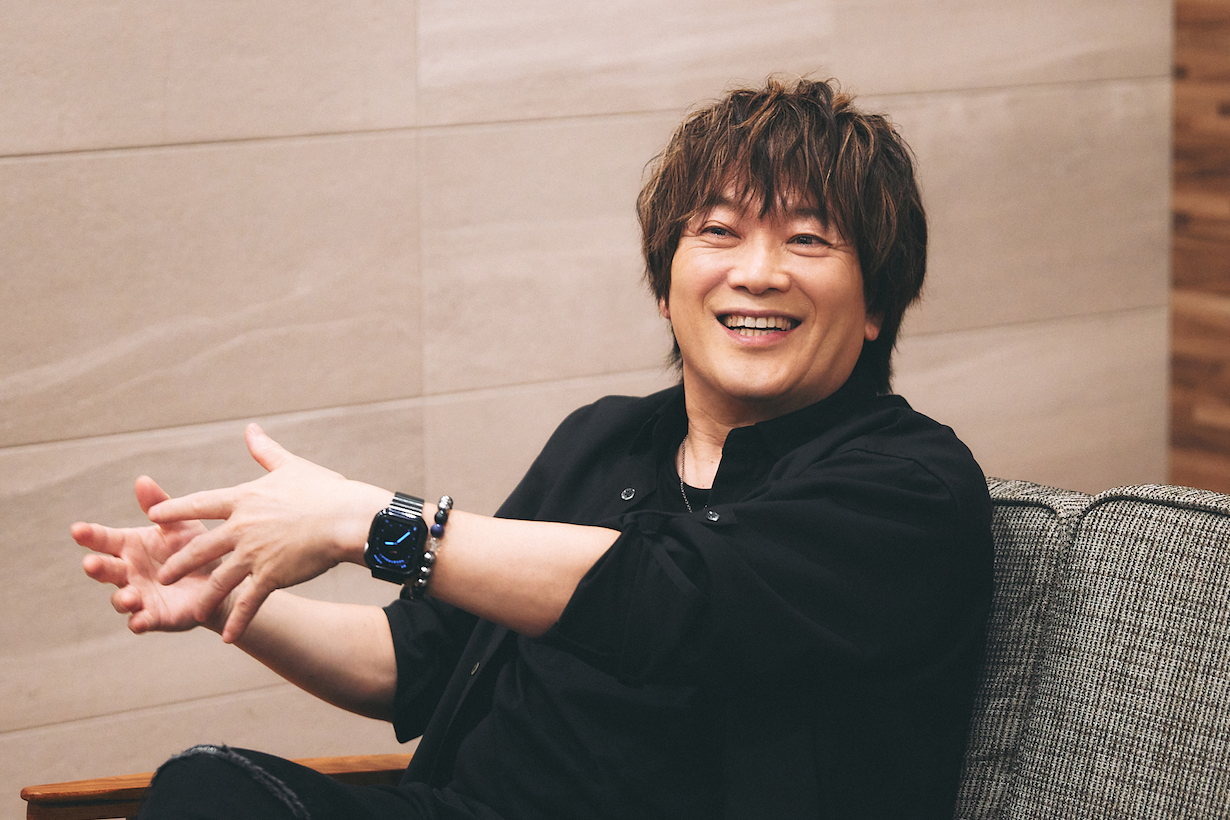
Hironobu Kageyama: Born in Osaka, 1961. Debuted as the vocalist for rock band "LAZY" in '77. Was the lead vocalist for the "Dengeki Sentai Changeman" series' theme song in '85. Subsequently became the lead vocalist for Dragon Ball Z's theme song, "CHA-LA HEAD-CHA-LA", and became a household name in Japan as an "anime singer". Formed the anime singer group "JAM Project" in 2000 and is still active as its leader.
――I would like to delve into the story around that later, but first I would like to ask you about the process leading up to singing "CHA-LA HEAD-CHA-LA".
Kageyama: I guess I should start by talking about how I ended up singing anime songs in the first place. I first debuted as a part of the rock band "LAZY", but when we eventually split up, I went on to become a solo artist. I was 20 years old at the time, and the period after that was the toughest stretch in my career as a singer. I just couldn't find a good groove, and the crowd numbers at my gigs started to dwindle.
That went on for about 4 years. Then, in 1985, I got a call from the director of Nippon Columbia out of the blue telling me that he was putting me in charge of the theme song for "Dengeki Sentai Changeman". I felt so lucky that the director had sought me out. According to him, since the start of the '80s, the industry had started to favor more upbeat music for anime songs, and so he'd been searching for a rock singer who could sing them.
――And that was when everything changed, and you entered the world of anime songs?
Kageyama: Pretty much. After that, I sang the theme song for "Saint Seiya: Knights of the Zodiac", "Saint Shinwa -Soldier Dream-", in 1988. I followed that up with "CHA-LA HEAD-CHA-LA" in 1989, which made two years in a row I'd sung the theme song for an anime adaptation of a manga from Weekly Shonen Jump. That was really what altered the direction of my life for good.
Since I first sang "CHA-LA HEAD-CHA-LA", all the way to this day, I've never once worried about the future. The path I started on all those years ago led me to forming JAM Project, and I'm still on that same trajectory at this very moment.
"CHA-LA HEAD-CHA-LA" Originally Sounded Like a Bon Jovi Song
――When you heard the first demo for "CHA-LA HEAD-CHA-LA", what did you think of it?
Kageyama: Before Yukinojo Mori wrote the lyrics, I was actually told by the Columbia director that from here on, Dragon Ball's title would be changing to "Dragon Ball Z", and that since I was going to be the new theme song's singer, he wanted me to make a demo tape to be used in an upcoming presentation. So, me and my band made a demo in a sort of American-rock style, which sounded similar to a lot of Bon Jovi's music. At the time, I thought it sounded pretty cool.
So, when I got a hold of the final arrangement and realized that it'd completely changed, I was totally lost for words. To be perfectly honest, I wasn't even sure whether it sounded good or bad.
――It's not American rock, that's for sure.
Kageyama: No, it isn't. The bass riff has a swing to it, and the song has a distinct '80s pop vibe. As opposed to screeching guitar chords, there are high-pitched tones coming through from the keyboard. It's totally different from the mainstream rock aesthetic of the time, and there just weren't any composers out there putting together that type of arrangement. So it was the overall sound, as well as the lyrics, that were all-new and original. Since I'd been singing rock up until that point, to me, it was a complete revelation.
The producer in charge of the song's final arrangement was a huge lover of club music, and they were doing something like what's now called "step recording" since way back then.
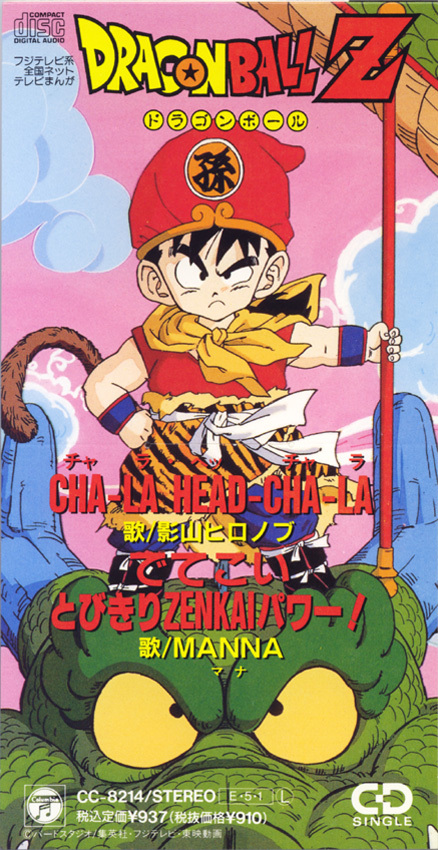
Original "CHA-LA HEAD-CHA-LA" CD
――What was your first impression of the lyrics?
Kageyama: Honestly, I thought it was some sort of practical joke. *laughs*
But, since I'd known Yukinojo Mori since I was a teenager, I figured that he's the type to do something this crazy. I wonder if he'll get mad at me for saying that? *laughs*
There's also the fact that, at the time, most lyricists mainly prioritized showing off their own style through their lyrics, whereas Yukinojo Mori prioritized the singer's enjoyment. He was of the mindset that, if the singer doesn't feel they can enjoy themselves while singing a set of lyrics, then it's nothing more than a poem. He'd actually been close with the members of the band Yonin Bayashi* since high school, so his way of thinking was undoubtedly rock 'n roll. The thought that doing things that other people are already doing is dull and boring is pretty central to his character as a creator.
(*Note: Yonin Bayashi was a famous progressive rock band, known in part due to its leader, Masahide Sakuma.)
As a bit of an aside, I've actually been asked so many times in foreign interviews what "chala hechala" means in Japanese. *laughs*
――When you think about it, it's definitely a strange phrase. *laughs* By the way, how do you answer that question?
Kageyama: I tend to say that "hechala" is kind of like "no problem", and then "chala" is just stressing that. Like saying "very no problem". *laughs*
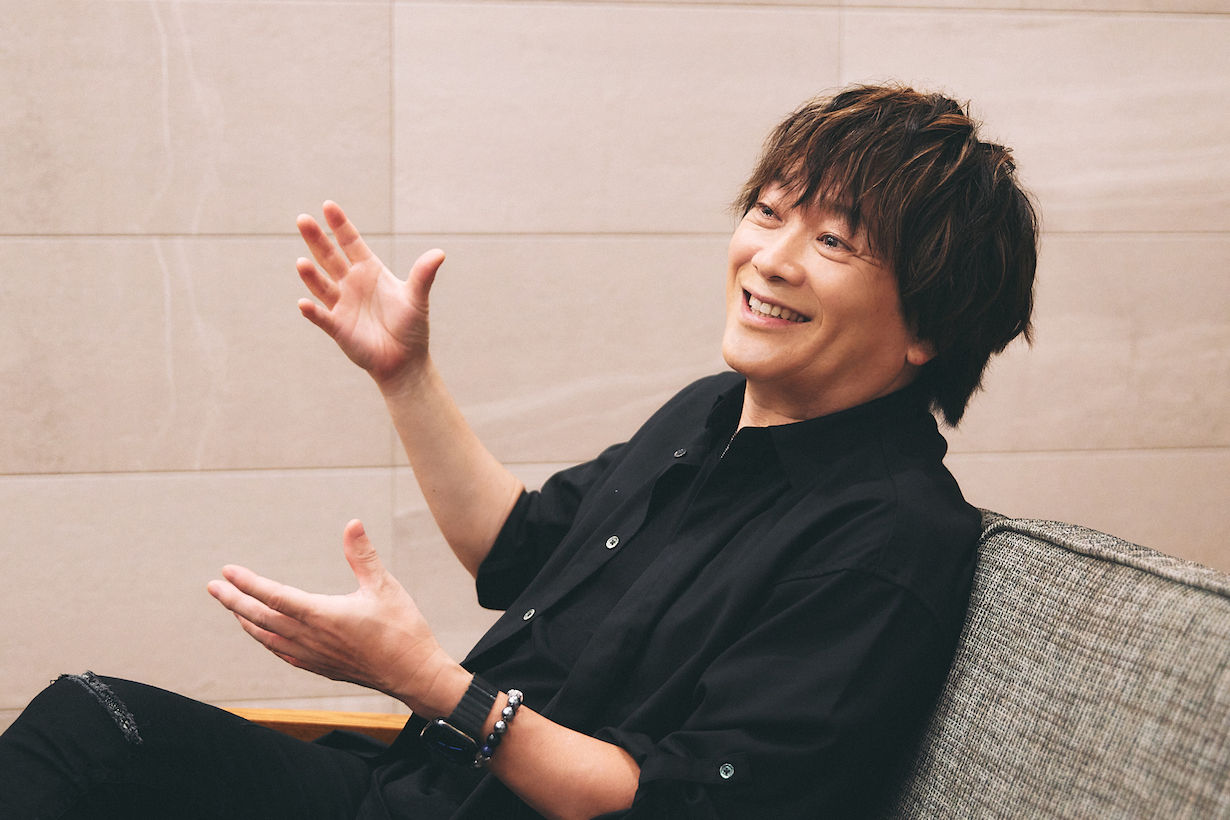
――Returning to our original conversation, it sounds like "CHA-LA HEAD-CHA-LA" really was born out of Yukinojo Mori's unique talent and the tendency of the song's producer to always be on the lookout for the newest trends in music. Can you tell us about your experience of recording the song?
Kageyama: It felt like such a breath of fresh air, and it was so fun to sing. Even though the song was obviously something completely brand-new, there was still so much rock 'n roll in there. As someone who was raised on British rock bands like Deep Purple and Led Zeppelin, it definitely had a lot of familiar elements.
There's the thwang-ing of the guitars as you build up to the chorus, then the big punch of instrumentals and vocals as it hits! ...It's actually pretty hard to describe with just words. *laughs*
――I think you nailed it. There's a buildup of tension, then a triumphant release. Perhaps what's most amazing though, is that at the time of recording, you were still working on a construction site
Kageyama: I'd actually been doing that job for several years by then, and since I was still in my late 20s at the time, I was pretty tough, both mentally and physically. I was doing it because there was no other way to continue playing the music I loved while supporting my family, so I never once thought of it as a burden.
A Recording Session Like a Science Experiment
――We touched on this briefly earlier on, but after "CHA-LA HEAD-CHA-LA", you released track after track for "Dragon Ball Z". You must've been recording them at a pretty high pace, right?
Kageyama: Yeah, you're right. At the time, Columbia was behind about 70% of all the anime songs being released. Recording three or four songs in a day was a regular occurrence. It was just day after day of recording.
――All that singing was surely tough, but making that many songs can't have been easy either! Can you tell us a bit about all the staff who were involved in creating the music for "Dragon Ball Z"?
Kageyama: Back then, the music producer at Columbia was Mr. Uchida. He formed a special team that focused specifically on music for "Dragon Ball Z" called PROJECT "MONOLITH".
There were four main singers. The male singers were me and Shinichi Ishihara, and the female singers were KUKO (who performs with the stage name "Ikuko" these days) from the band Waffle, and YUKA. Then there was the composer of "CHA-LA HEAD-CHA-LA", Chiho Kiyooka, and the synth programmer from Yellow Magic Orchestra, Hideki Matsutake. Finally, Sakiko Iwamuro and Dai Sato were in charge of the lyrics.
――Is that the Sato who's currently working as a top screen writer?
Kageyama: That's the one. When we were all together on that team, he was making "Dragon Ball Z" music literally non-stop. He wasn't making hard-hitting rock music, instead it was always rough-around-the-edges yet somehow refined-feeling music that was pretty unique in the anime song genre. It was all completely original—just like Dragon Ball.
――As a child, I was content to just listen to the songs for what they were, so I didn't realize at the time, but there really were a lot of super out-there songs. One that springs to mind is "spacepeopleDBZ", the song where you rapped!
Kageyama: That's right! Actually, the story behind that is that Dai partnered up with Yoshinori Sunahara, a.k.a. "Marin", from the band Denki Groove, and they were super enthusiastic about getting me to rap. I was pretty surprised! I mean, it was rap. *laughs*
When I showed up to the recording studio, I still hadn't seen any lyrics or anything, but Dai just started rolling the instrumental and said something super vague, like, "The rhythm is kinda like this. Let's give it a try." It felt a bit like a science experiment.
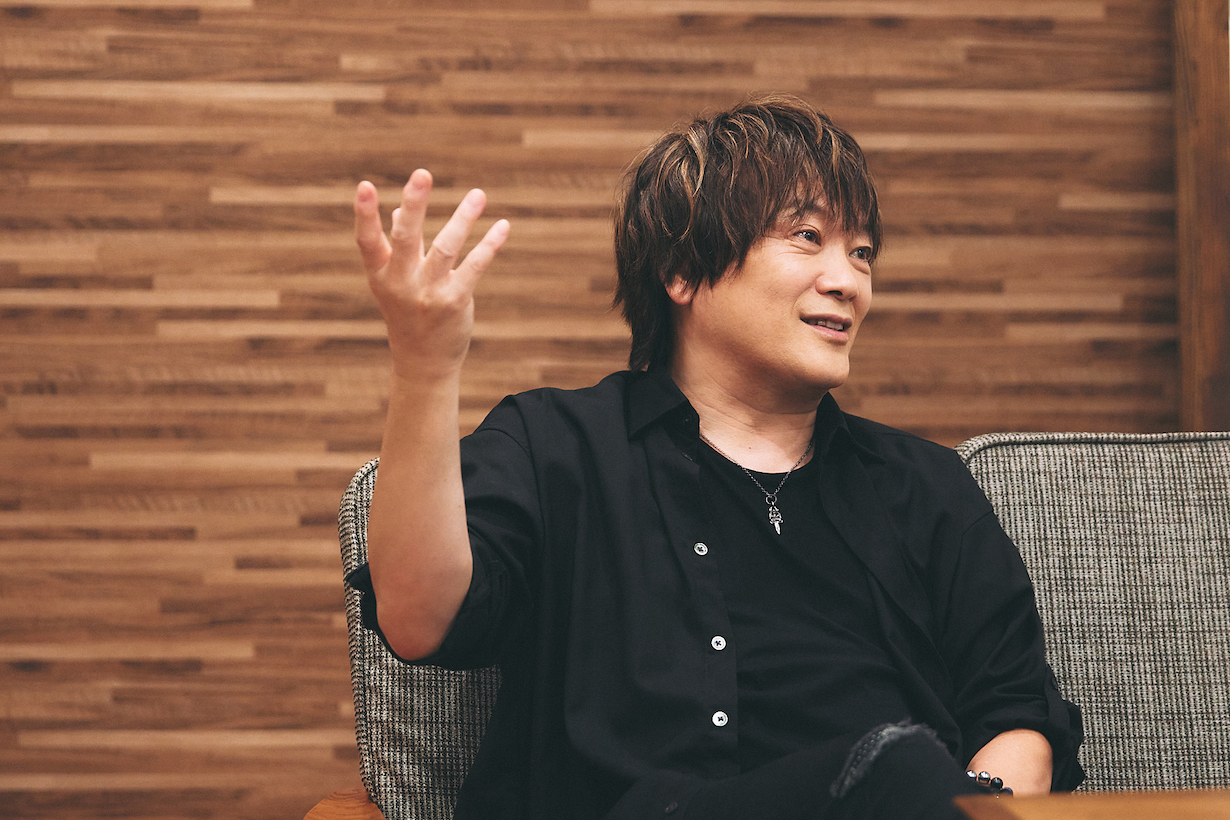
――For "spacepeopleDBZ", Sato and Marin are listed as "STEREOTYPE" in the credits, but it turns out the three of you actually recorded it trial-and-error style.
Kageyama: It was so much fun, though. As a part of the recording process, there's a step called "track down"*. For that, I was just watching from the sidelines, but it was fascinating see it all happen.
(*Note: 'Track Down' is a process that involves taking all the components that were recorded separately and compiling them into one piece while making any necessary adjustments to each.)
Typically, a sound engineer will make adjustments based on the producer's instructions, but for "spacepeopleDBZ" it was just Marin as the producer and a friend of his as the sound engineer. They both stood in front of the mixing desk dancing, loosely communicating with their eyes, layering on different filters like they were DJs, and we would record something then they would listen to it, then record, then listen, and so on. They both got so into it and just kept making adjustments here and there as we went.
I remember thinking I'd never seen people who were this care-free. It was a pretty big culture shock!
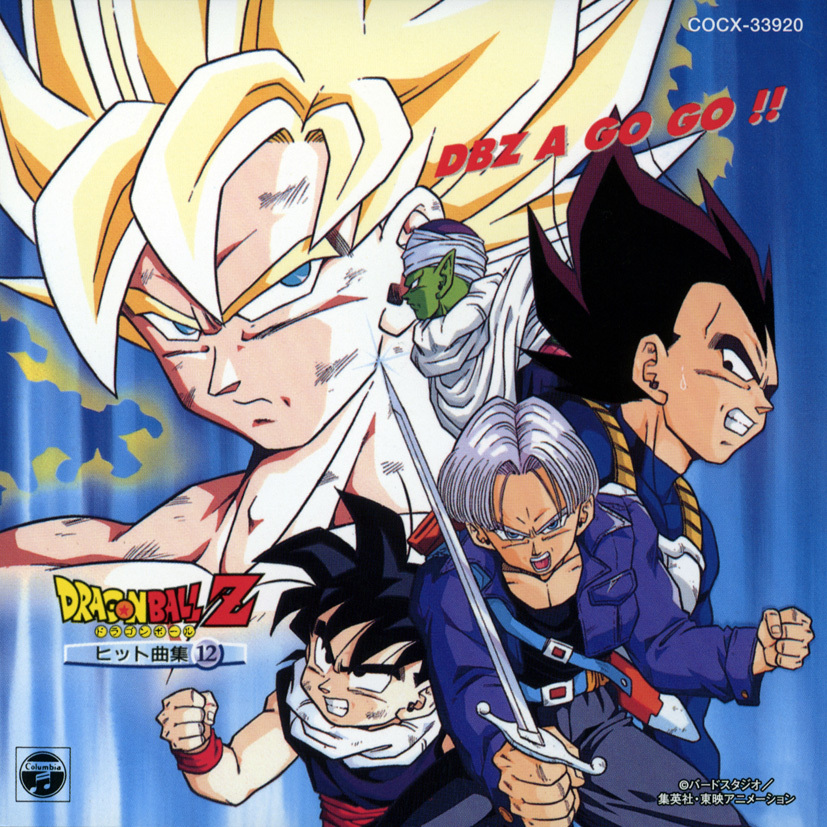
"Dragon Ball Z Hit Song Collection 12" features "spacepeopleDBZ"
――That's wildly different to the standard image of an anime song's recording session!
Kageyama: Absolutely. But even though I was pretty taken aback, I didn't dislike it at all. I'd go so far as to say that experiencing something as far-out as that helps me today when I'm songwriting. Because I have that experience, my repertoire as a rock singer is wider than most. I certainly feel that way when I enter song contests and stuff.
The Singer That Hironobu Kageyama Thought He Could Never Compete With
――So that's the story of a young creator going all out to make something completely original in the relatively unrestricted genre of anime songs. Were there any other members of the team you felt had a big impact on you?
Kageyama: There was, yes. When I listened to Shin's (Shinichi Ishihara) recording session, I remember thinking, "Honestly, the way things are now, there's no way I can top this guy when it comes to a song like this."
In terms of the songs with more of a youthful-rage aspect to them, I was sure I could do a better job, but for the slower ballads like "Aquarium no Yoru", or for songs with a funk music feel like "E na E", I just couldn't give a performance as good as his. I wanted nothing more than to find some way, some technique, to be able to sing those kinds of songs.
――So, after meeting someone with that kind of talent, you underwent your own "training" and improved your abilities as a singer.
Kageyama: Thinking back on that period, I guess you could say the unholy amount of recording sessions I went through was my training. *laughs*
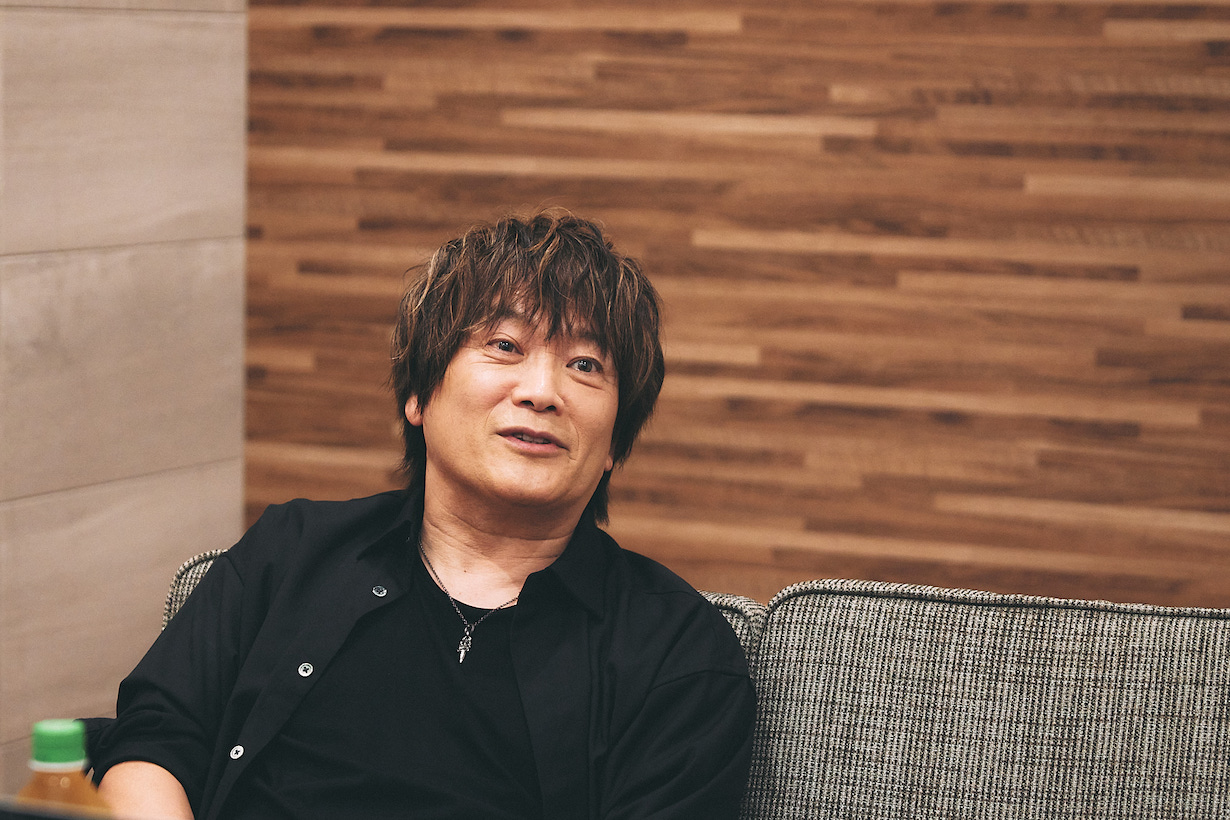
――But your ballads are amazing too. The song you performed at the 30th anniversary event, "Comet Library", was particularly special.
Kageyama: I love that song too. *laughs* It's the same as with rap, but I really enjoyed the fact that working on Dragon Ball gave me the opportunity to sing songs outside of my normal repertoire.
――Is there a particular song that you feel a certain affinity for?
Kageyama: That's a tough question... Maybe "Marugoto" or " MIND POWER...Ki...". But then again, I also love songs like "'Ya' na Koto ni wa Genki Dama!!" and "Unmei no Hi: Tamashii vs. Tamashii". That doesn't really narrow things down, though. *laughs*
Oh, and I'd be remiss not to mention my duet with KUKO, "Eien no Yakusoku". Even now, I always tear up to the point where I can't sing whenever we perform that song together.
――Just by listening to the songs from Dragon Ball, fans can enjoy your full range as an artist.
Kageyama: You could easily put together a full concert with just Dragon Ball songs. *laughs*
Performing "CHA-LA HEAD-CHA-LA" at Prince Hotels and Horse Races
――I'm sure all that recording was tough, but at the same time, you were also traveling all over and doing a lot of gigs, such as hotel dinner shows, right?
Kageyama: They weren't exactly dinner shows; more like family-friendly events with character shows and my own performances. After the part of the show with people dressed up as various characters, a singer would come out on stage and sing the relevant anime's theme song. It's a bit strange but, during Christmas and Golden Week*, I felt like I was on a tour of the country's Prince Hotels. *laughs*
(*Note: Golden Week is a week at the start of May with many Japanese national holidays.)
――Like a Japanese Prince Hotel pilgrimage. *laughs*
Kageyama: Exactly. And it was a yearly one at that!
――I'm sure you've experienced so much over the years, but are there any shows that were particularly memorable?
Kageyama: Hmmm... Probably the time I performed with Masako Nozawa (Goku's voice actor) at JRA's absolutely massive horse race event. In Goku's voice, Masako announced "Heya, everyone! Thanks for comin'! Kageyama's here today too!". Then I jumped in and started singing "CHA-LA HEAD-CHA-LA". Actually, there are often family-friendly events at big racetracks.
――You AND Masako Nozawa, that sounds spectacular...!
Kageyama: Then, if we're talking about experiences abroad, I'd say the time I performed "CHA-LA HEAD-CHA-LA" at "Salón del Manga" in Barcelona, Spain, and the crowd sang the chorus with me—in Japanese! I was honestly blown away by the passion they were singing back at me with. It was awesome.
I'm the "CHA-LA HEAD-CHA-LA" Singer
――The fans are as energetic as ever, but even though you're in your 60s now, you're still full of life and showing no signs of slowing down. What gets you up in the morning?
Kageyama: I'd have to say 'curiosity'. Recently, I've been a bit obsessed with taking TOEIC*. My scores are still pretty low, though. *laughs*
I figured I'd love to be able to speak to the crowd a bit more when I do shows abroad, and that's what led me to knocking on the door of a local English conversation school. I always thought my English was kinda bad, but when you get into it, it's really fun.
(*Note: TOEIC is an international standardized test of English language proficiency for non-native speakers.)
――Having the drive to follow through with your curiosity is amazing...! It's just occurred to me now, but curiosity plays a central role in Dragon Ball too, right? It's that curiosity to seek out those who are stronger than yourself that often moves the story forward. And if that's the case, then I feel like you being the singer of the theme song really was meant to be.
Kageyama: I was a fan of Dragon Ball from before I was chosen to sing the theme song. When I was heading to my part-time job at the construction site, I would buy "Weekly Shonen Jump" and get hyped up reading the latest adventures of Goku and his friends.
When they came across an opponent way stronger than themselves, they would get down and depressed like any normal person would. Then, after getting their butts kicked, they would train and train and eventually overcome whatever obstacles they faced by fighting together. That process of theirs of working hard and earning each victory inspired me time and time again.
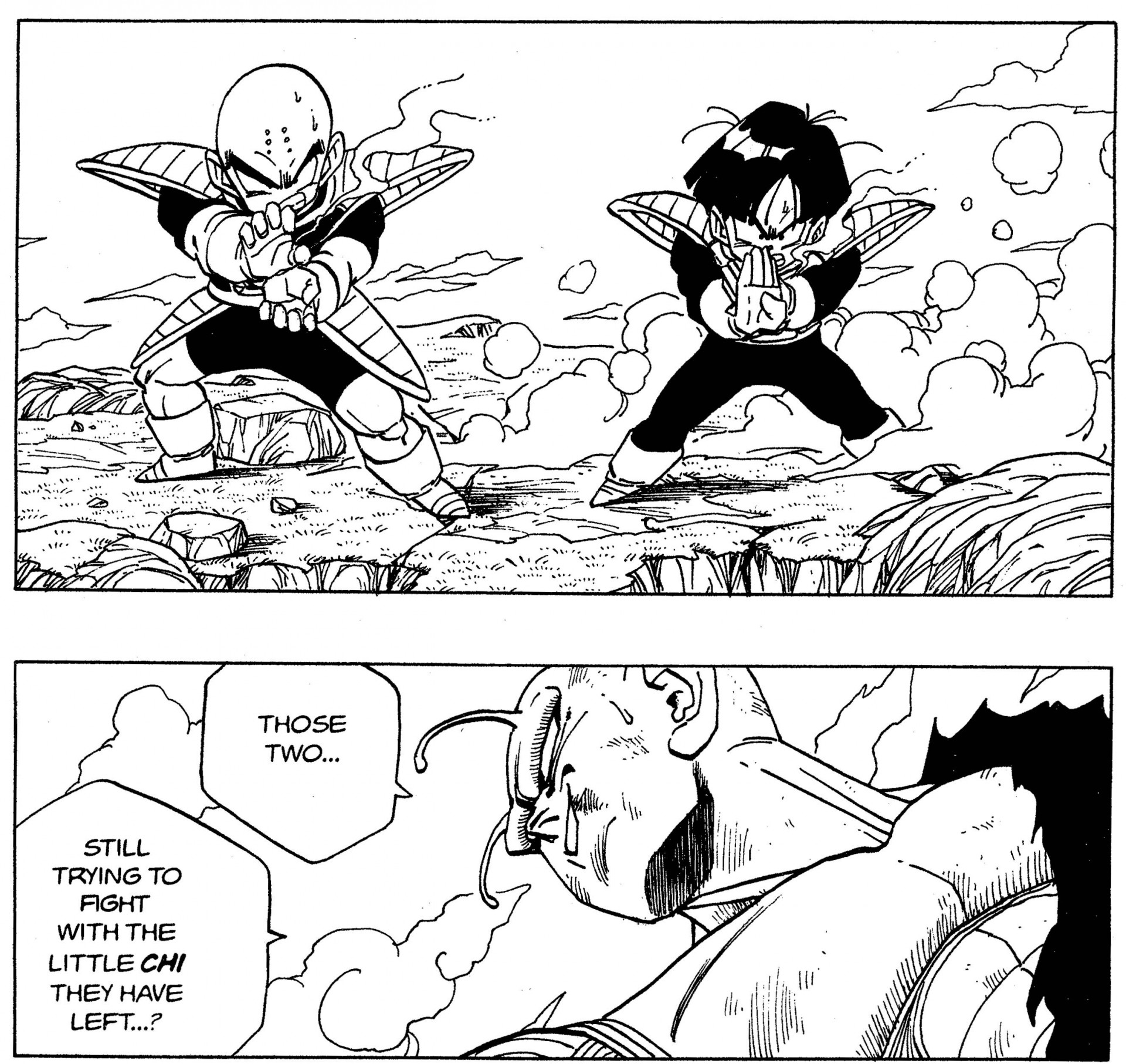
With their dwindling strength, Krillin and Gohan fight with Goku until the bitter end.
――It's an empowering story, no doubt.
Kageyama: After LAZY split up, we entered the era of Japanese metal, and singers with high-pitched voices started flooding in. In the midst of which was me, with my slightly husky, somewhat youthful-rage imbued voice that was neither high-pitched nor refined like a pop star's. I was really worried about how on earth I would be able to build a career.
But then I was fortunate enough to be introduced to the rough-around-the-edges yet somehow refined-feeling "CHA-LA HEAD-CHA-LA" and, as a result, found my path in life. I never thought I'd find a song that fit my voice so perfectly!
There are times at JAM Project shows when we perform "CHA-LA HEAD-CHA-LA" together, but even though Fuku (Yoshiki Fukuyama), Endoh (Masaaki Endoh), and Dani (Hiroshi Kitadani) are all amazing singers, when they sing "CHA-LA HEAD-CHA-LA" it just isn't quite the same. It always makes me think that that's my song. You could say that I'm not even an anime song singer, I'm literally the "CHA-LA HEAD-CHA-LA" singer! *laughs*
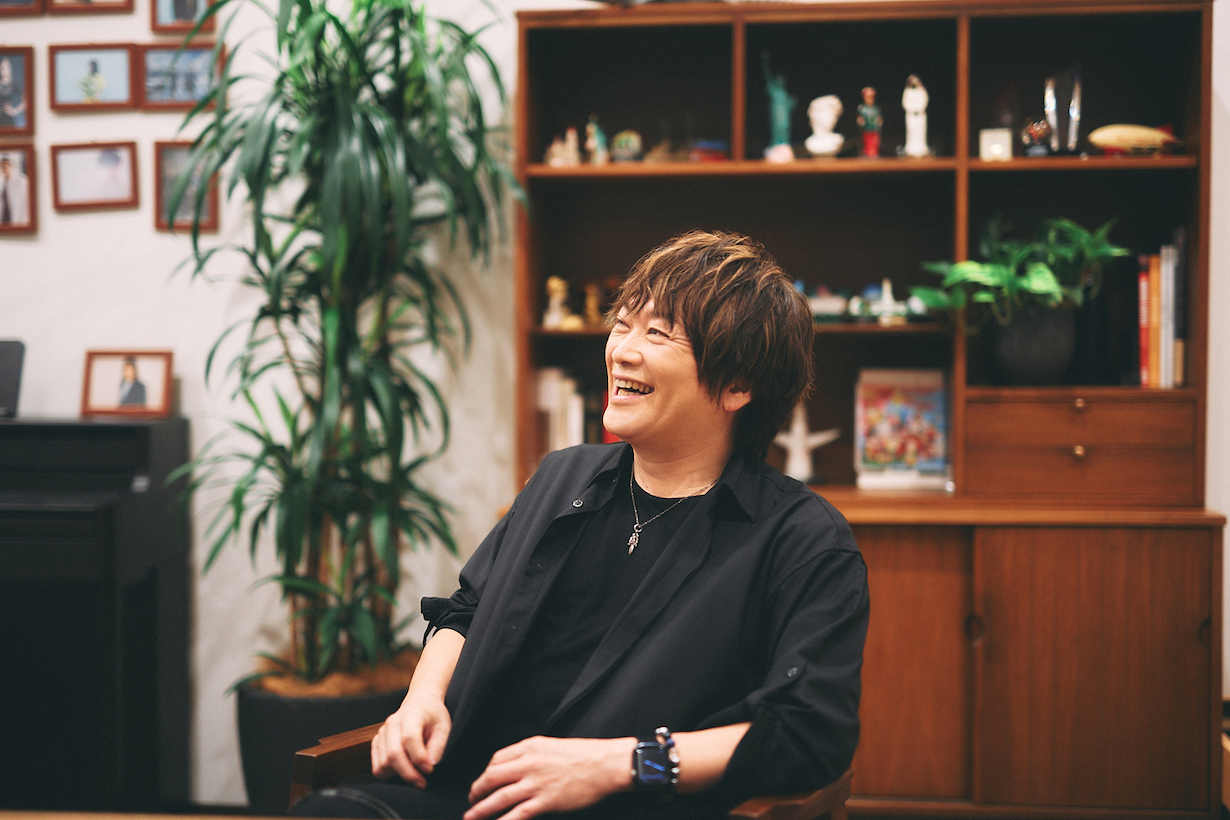
Interview & Article: Hisashi Maeda
Photography: Kayo Sekiguchi
This site includes machine-translated texts. Please be aware that you might find some unusual expressions that are difficult to understand.
Post
Confirm Post
Post the above comment?
Reply
Confirm Reply
Post the above comment?
Are you sure you want to delete this comment?
Report successful
Post Unsuccessful
This user will be muted.
You will be unable to see comments from muted users in the comments area.
*To unmute users, navigate to the "Comments" area on MY PAGE.
Reply
Confirm Reply
Post the above comment?
Edit
Post
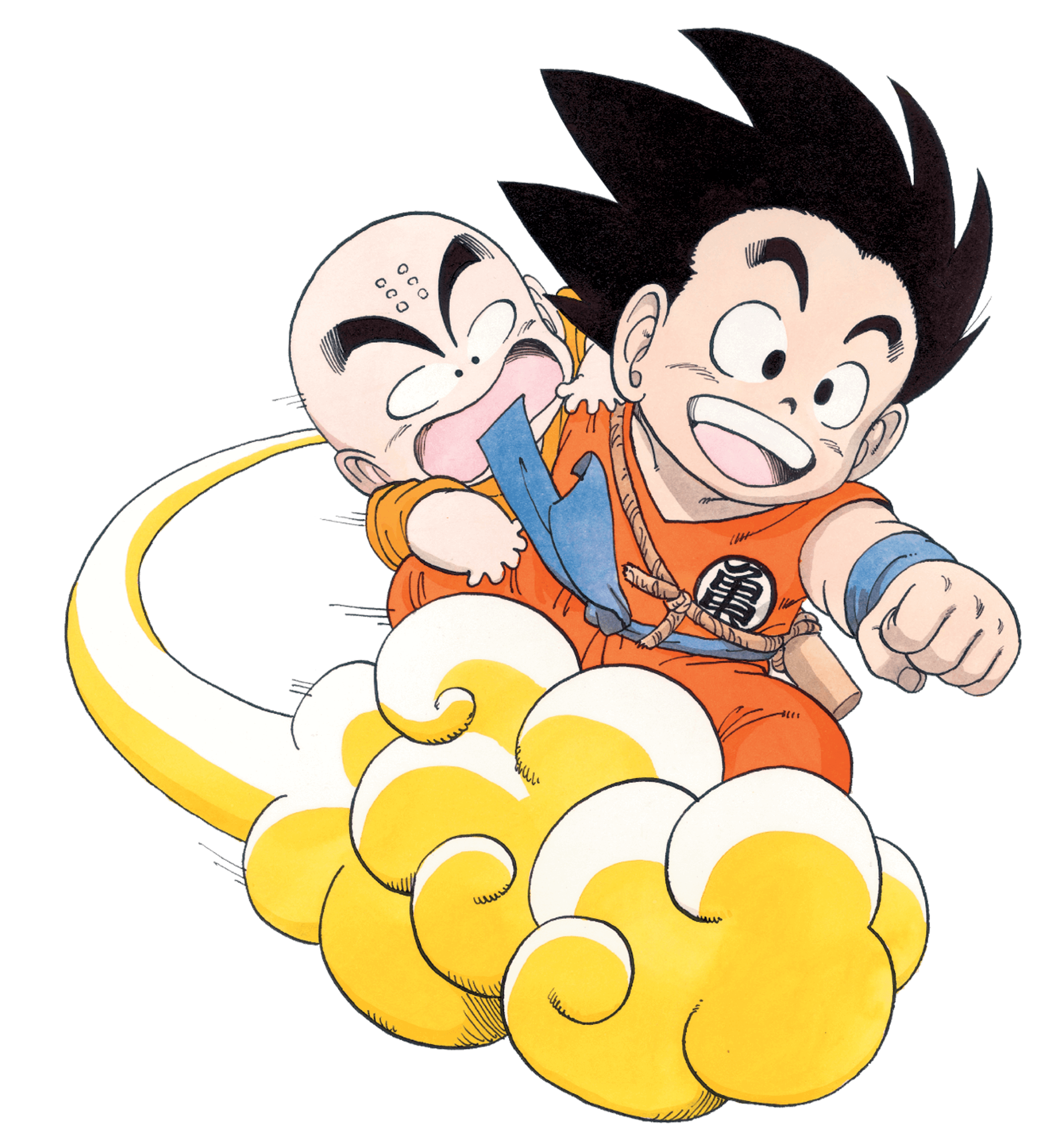

Post
Confirm Post
Post the above comment?
Edit
Post